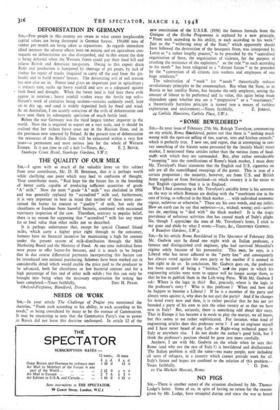DEFORESTATION IN GERMANY
Sig,—Few people in this country are aware to what extent irreplaceable capital values are being destroyed in German forests. 150,000 tons of timber per month are being taken as reparations. As regards immediate allied interests the adverse effects both on mining and on agriculture con- sequent on deforestation are also disregarded, and to this extent the date is being deferred when the Western Zones could pay their food bill and relieve British and American tax-payers. Owing to this export drain Ruhr coal production is hampered by shortage of pit props, by lack of timber for repair of trucks (required to carry off the coal from the pit- heads) and to build miners' houses. The devastating evil of soil erosion has now also set in. Forest land plays an important part in agriculture ; it attracts rain, sucks up heavy rainfall and acts as a safeguard against both flood and drought. When the forest land is laid bare these evils appear in rotation ; heavy rainfall washes away the fertile top soil— Nature's work of centuries being- undone—streams suddenly swell, later on to dry up, and sand is widely deposited both by flood and wind. As an Australian,. I am acutely conscious of the evils of deforestation and have seen there its subsequent spoliation of much fertile land.
Before the war Germany was the third largest timber importer in the world. Now she is required to export on a vast scale, and it should be realised that her richest forest areas are in the Russian Zone, and in the provinces now annexed by Poland. At the present rate of deforestation the resources of the British Zone will be exhausted within a very few years—a permanent and most serious loss for the whole of Western Europe. Is it not time to call a halt ?—Yours, &c., E. J. BRYCE. Stanhope Court Hotel, Stanhope Gardens, S.W.7.


































 Previous page
Previous page